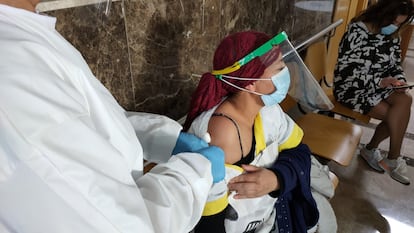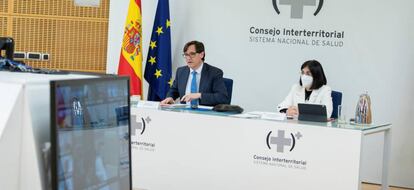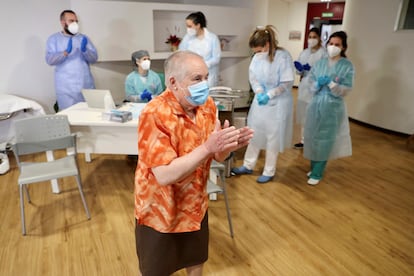As some Spanish regions roll out Covid vaccine at high speed, others lag behind
Asturias has managed to administer 81% of received doses so far, while Madrid has only used 6% and Catalonia 13%

The Covid-19 vaccination drive has begun in Spain at vastly different speeds, depending on the region. While some areas have barely used 5.2% of the doses they have already received, as is the case of Cantabria, Asturias has managed to deliver 81% of the doses.
In terms of the country’s most-populated regions, Madrid – with 6.6 million inhabitants – is at the bottom of the list, having used just 6% of the vaccines it has so far received. It is followed by Catalonia, which has a population of 7.6 million people and has administered 14% of its vaccines, Valencia (16% with a population of five million) and Andalusia (37% with 8.5 million residents).
Health Minister Salvador Illa said on Monday that all Spaniards will have access to a “safe and reliable” vaccine this year, and confirmed that the ministry has delivered a second batch of 360,000 vaccines to the country’s regions, which are in charge of their own healthcare systems and the vaccination process. These doses are due to be administered this week.

When looking at the percentage of the doses that have been injected so far, it should be pointed out that the majority of Spain’s regions are keeping back one vial for every one that is administered, given that the Pfizer vaccine that is being used requires two doses. This means that, for example, if there was enough of the immunization for 100 people, it would be administered to just 50 recipients and the rest would be held for the second dose 21 days later. This is the general approach, albeit not across all regions, something that makes it difficult to compare the efficiency of the process in each area.
An example of this is the Basque Country. According to Manuel Sánchez-Lagarejo, the sales director of Bexen Medical, the company that is storing and distributing the vaccine, around 20% of the 16,000 doses that have been received so far are being stored for safety. The rest have been used for the first vaccination, 40% of the total, and the remaining 40% will be used for the second shot.
According to the central government’s plan, the vaccination campaign has begun in the country’s care homes, with seniors and staff the first to receive the shots. But there are two factors that have made a difference in the speed of the process. In Madrid, for example, no vaccines have been administered on holidays such as New Year’s Day. In the Canary Islands, this was not the case, and Catalonia will now be vaccinating even when it’s a holiday. The second factor is the number of personnel working on the campaign. In Madrid, 46 teams of two nursing staff have been set up – a total of 92 people, plus 22 in training. In Catalonia, there are 500 nurses who have volunteered to administer the vaccine, and in Andalusia there are 500 working full time on it.

Catalonia has received 60,000 doses a week, but in the first week of the campaign – which got off to a symbolic start on December 27 – just 8,293 shots were administered. The process didn’t begin properly until December 30, due to the logistical problems that Pfizer encountered and that saw a delay in delivery from December 28 to 29. But the problems persisted, and on January 1, which was a national holiday, only two vaccines were administered in the whole of Catalonia. The reason for this, as the regional health chief Alba Vergés admitted on Monday, was that the teams of nurses had not been organized or trained in time. As many as 6,000 nurses have signed up to work overtime on the campaign, but the regional government is yet to organize their timetables.
Last week in Catalonia, just 200 nurses – rather than the 500 needed – were able to administer the vaccines. The public health secretary in the region, Josep Maria Argimon, said that the teams have been organized for this week and was convinced that the speed of the process would be ramped up in order to reach the objective of 748,000 people before May. “Everyone is very nervous, but this is a long-distance race and we cannot judge the results in four days,” he said.
Meanwhile, in Cantabria the process has got off to a “very slow” start, the health chief Miguel Rodríguez admitted on Monday, explaining that the nursing teams had to be trained, and that the registers of residents and employees in each senior home had to be revised as well as ensuring that there is no outbreak in the centers (the vaccine is not recommended for use in people with an active infection). Rodríguez added, however, that he believed there would be more than enough time for the campaign, given that the process will go faster once it moves out of senior homes, and that by that point a lack of supply could be the factor that slows things down.
The vaccination campaign has begun in the country’s care homes, with seniors and staff the first to receive the shots
Based on the regions that have so far supplied data, around 100,000 people have been vaccinated in Spain. That is 0.2% of the population, at the same level as Italy and Croatia, for example, but far from the 14.14% seen in Israel, according to the Our World in Data website, which is using government sources for its information.
These 100,000 vaccinations represent around 27% of the doses so far distributed, according to data supplied to EL PAÍS by the regions. But taking into account that a second vial is being held back for the next dose, this means the real rate is around 50%.
If this figure is compared, one of the regions with the best results is the Canary Islands, which with 2.2 million inhabitants has put 130 people to work exclusively on the campaign – this is more than in Madrid, which has triple the population. The Canaries have so far used 41% of the received doses, according to a spokesperson from the regional health department.
In Galicia, where 51% of doses have been administered, “the process is working,” said Álvaro Carrera, the head of the Galician Association of Family and Community Nursing. “There have been some occasional logistical issues, as in any campaign, but if there were more doses, we would be able to administer more.” In Ourense, a province with 310,000 inhabitants, nearly the same number of doses have been administered as in Madrid, which has a population of 6.6 million. Sources from the region’s health department attribute this to the fact that the 22 nurses who are working to vaccinate the 6,000 seniors who live in homes in the province are “very well trained.”
The Balearic Islands reported that it has used 37.5% of the received doses, despite having to suspend the process on Ibiza after a positive coronavirus case was detected in one of the senior homes. Adding to the delay are the national holidays and the difficulty of setting appointments for the health professionals who were due to be vaccinated this week. The Ibiza authorities have called on the regional government to streamline the calendar so that they are not left behind.
The Madrid health chief, Enrique Ruiz Escudero, said on Monday that the slow rollout of the vaccine in his region is down to a number of senior residences requesting the process be delayed because a number of residents and staff were absent from their centers due to the Christmas holidays. Escudero denied that the region lacked staff for the campaign but added that private resources may be used “according to the needs” of “each situation.”
The regions are trusting that once this week is over, and the Kings’ Day holiday (January 6) has passed, the process will get up to speed. The first person in Spain to receive the vaccine, Araceli Hidalgo, 96, will be due for her second shot on January 17.
Speaking after a meeting on Monday with the country’s health chiefs, Health Minister Salvador Illa avoided making comments about the different speeds with which the regions are rolling out their vaccines. He insisted that the process had started well and that if there were bottlenecks it would be due to a lack of supply, rather than the inability of the regions to carry out the vaccinations. The minister cited the example of the fact that, this year, 14 million people are expected to be vaccinated with the flu jab in just eight weeks.
With reporting by Josep Catà, Lucía Bohórquez, Fernando Peinado, Juan Navarro, Mikel Ormazabal, Sonia Vizoso, Javier Martín-Arroyo and Cristina Vázquez.
English version by Simon Hunter.
Tu suscripción se está usando en otro dispositivo
¿Quieres añadir otro usuario a tu suscripción?
Si continúas leyendo en este dispositivo, no se podrá leer en el otro.
FlechaTu suscripción se está usando en otro dispositivo y solo puedes acceder a EL PAÍS desde un dispositivo a la vez.
Si quieres compartir tu cuenta, cambia tu suscripción a la modalidad Premium, así podrás añadir otro usuario. Cada uno accederá con su propia cuenta de email, lo que os permitirá personalizar vuestra experiencia en EL PAÍS.
¿Tienes una suscripción de empresa? Accede aquí para contratar más cuentas.
En el caso de no saber quién está usando tu cuenta, te recomendamos cambiar tu contraseña aquí.
Si decides continuar compartiendo tu cuenta, este mensaje se mostrará en tu dispositivo y en el de la otra persona que está usando tu cuenta de forma indefinida, afectando a tu experiencia de lectura. Puedes consultar aquí los términos y condiciones de la suscripción digital.








































